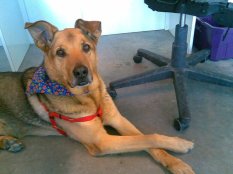
 As the years pass, our animal companions may start to
experience a few age-related issues. Many of these problems
are not serious, but some can be - and it's always wise to
keep a watchful eye on your senior pet. Check your pet
regularly for warnings signs and take him to the vet for
assessment if you notice something out of the ordinary.
Watch for signs that include:
As the years pass, our animal companions may start to
experience a few age-related issues. Many of these problems
are not serious, but some can be - and it's always wise to
keep a watchful eye on your senior pet. Check your pet
regularly for warnings signs and take him to the vet for
assessment if you notice something out of the ordinary.
Watch for signs that include:
Unusual lapses in housetraining.
A pet that may have been rock-solid steady in his housetraining may start eliminating in inappropriate places. The first thing to do in this case is bring your pet to the vet to rule out (or treat) any underlying medical conditions that may be causing these lapses.
Increased thirst or urination.
This can point to possible health problems, as can excessive panting or exhaustion after minimal exertion. Canine diabetes is one condition that can cause increased thirst or urination. Early treatment is best.
Sudden loss of weight or appetite.
A similar warning sign is an increased appetite without a corresponding increase in weight.
Persistent vomiting or diarrhea.
Vomiting or diarrhea that does not resolve within a day or two is cause for concern.
Check your pet for lumps and bumps.
Check particularly for any lumps or bumps that appear suddenly or that appear to change in size, shape, texture, or color. Check all over his body, including in between his paw pads. Note the location and size of the lumps and contact your vet for advice. Do not try to diagnose the lump yourself.
Changes in your pet's coat.
For example, dryness or hair loss.
Decreased mobility in older dogs.
You might notice that your pet has trouble getting up or climbing stairs, or perhaps he doesn't like to rough house with the other pets anymore.
Exercise is still important to keep older pets healthy. If your pet's mobility is on the decrease, adjust his his exercise routine (shorter walks, swimming, etc) with input from your vet. Likewise, try to keep him at a healthy weight as it will put less stress on his joints.
Changes in hearing or vision.
For instance, you might notice that your dog doesn't come on command anymore, starts reacting as if he's startled when someone approaches, or begins bumping into things.
Behavioural changes.
This can include confusion (even to the point where he doesn't recognize members of the family), disorientation, restlessness, separation anxiety when none existed before, and more.
You may also wish to adjust your pet's food as required. Many commercial foods offer a "senior's" formula which is intended to meet the nutritional needs of older pets. As pets age, their metabolisms and activity level can change and they can become more prone to obesity if their diets are not adjusted accordingly.
Finally, take your pet to the vet for regular check-ups. Your vet may suggest a senior's blood panel to screen for some of the more common geriatric conditions to that they can be treated, if necessary.
Senior pets make wonderful companions and deserve to live out their remaining years happy and as healthy as possible. family - pets included!
To request reprint permission please contact us.
 Adopting a Pet from an Animal Shelter or Humane Society
Animal shelte
Adopting a Pet from an Animal Shelter or Humane Society
Animal shelte
 Monitoring Your Older Pet's Health
As the years
Monitoring Your Older Pet's Health
As the years
 Emergency Planning Tips for Pet Owners
Many people a
Emergency Planning Tips for Pet Owners
Many people a
 Vital Pet Vaccines: Responsible Pet Ownership and Awareness
So, youve bro
Vital Pet Vaccines: Responsible Pet Ownership and Awareness
So, youve bro
 Choosing a Dog Training or Obedience Class
Weve all seen
Choosing a Dog Training or Obedience Class
Weve all seen
Copyright © 2005-2016 Pet Information All Rights Reserved
Contact us: www162date@outlook.com